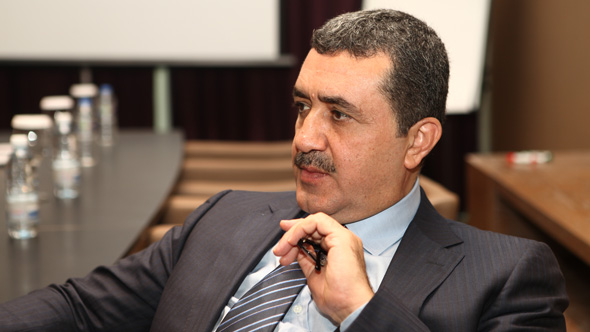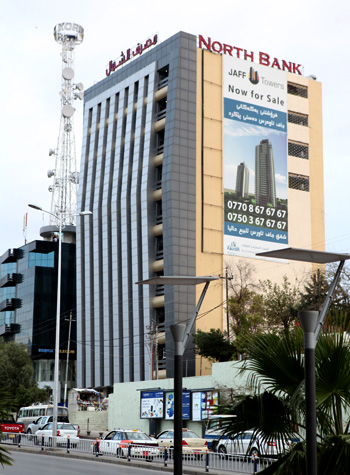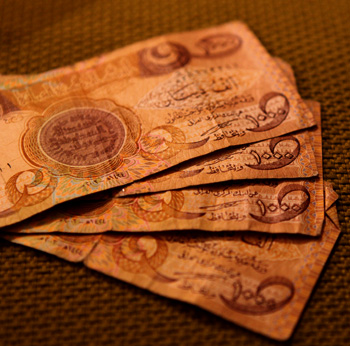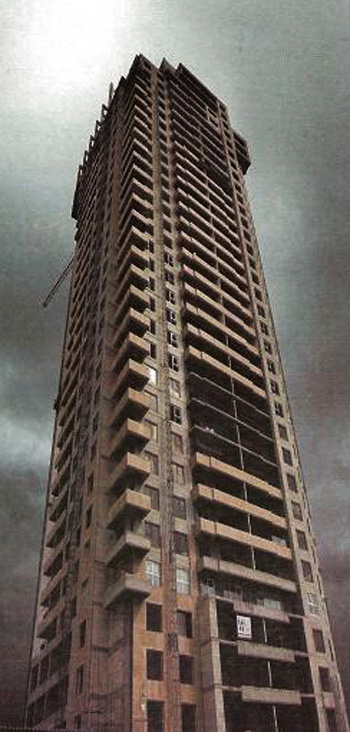Banking in Iraq: North Bank’s Views of Banking in 2013
Cash is today the safest method both in Iraq and Kurdistan. North Bank therefore is trying to gain the trust of all people – individuals and businesses – through various services including internationally-used credit cards or car loans. Another issue to resolve is the lack of skilled and experienced staff in the whole of Iraq – a result of the 23 years embargo in Iraq.

First question will be related to the banking sector in general. It is a relatively new domain in Iraq and there are many things to be done. Iraq used to be a socialist system so private banks didn’t really exist. It is now slowly developing and business people have grouped and created the first banks. There are foreign partnerships of course because the banks need capital. What is your overview of the banking sector in comparison to other countries?
As you mentioned, private banking is new in both to Iraq and Kurdistan. North Bank first started its operation in early 2004 and at that time we had some old socialist laws. In early 2004, there was a new law called the Ambassador Bremer law that enacted new banking laws in Iraq. That definitely created many conflicts between the old and new laws, in determining which laws to follow, but little by little most of these conflicts were bypassed. Some of the old socialist laws still exist; however, we try to bypass them in the daily matters.
As discussed, the banking sector is very new in this area. We came from a Kurdish domain family and we had the idea of opening a bank after the changes in Iraq in early 2003. We decided at that time to start this venture and we first licensed and opened North Bank in April 2004. Since then, we have had a very strong record of growth; we have increased our capital by more than 100 times in the past four years.  Today, in terms of total assets, we are the number one bank in the whole of Iraq, by a far distance from the second closest bank. According to our records for the third quarter of 2012, we have more than 1,374 billion Iraqi dinars in assets which is a little more than US $1.1 billion.
Today, in terms of total assets, we are the number one bank in the whole of Iraq, by a far distance from the second closest bank. According to our records for the third quarter of 2012, we have more than 1,374 billion Iraqi dinars in assets which is a little more than US $1.1 billion.
Starting a business in Kurdistan in particular and in Iraq in general was not very easy and there were many challenges; however, our services were much needed and over the course of the years North Bank has been successful in providing all the services that are needed in the business community in this area.
There is a number of foreign banks, in particular from Lebanon, that entered the market and received a license from the Iraqi Central Bank and the authorities. This will of course create competition between local Iraqi banks and the newcomers. We know that the Lebanese banks are very aggressive and have good people. For example, when they entered Jordan they aggressively took market share. What is your strategy to deal with this kind of competition?
This market is very new and it is an open market. The size of the economy in Kurdistan in particular and Iraq in general is so big that there is room for another hundred banks to enter the market. The banks that are here have very limited effects on the market because they are mostly involved in receiving deposits and limited letters of credit and money transfers. So we don’t look at these banks as competition at all. Competition comes if you actually get involved in the daily market business, which is the policy that North Bank is following. North Bank is the largest bank in terms of giving loans and we surpass the second closest bank in this area by at least three times. We welcome any other banks to do business in this area. Every bank has its own specialty and a new variety of expertise would definitely help this important sector to grow, be it in Iraq or particularly in Kurdistan.
Today, cash is the safest method both in Iraq and Kurdistan. What we are trying to do is to gain the confidence of the people… We want them to know that if they keep their money with us, it will be safer, we will provide more services, and we will help them with their daily matters and business.
What are the prospects for the growth of the banking market in the whole of Iraq including Kurdistan?
Every year we have at least 50 or 60 percent growth. Some years we had 200 percent growth. It doesn’t mean we are particularly good; it means we are very small compared to the overall size so we can be extremely big in the near future. Once we are confident we can provide the services, we will grow better and become bigger. We are a little hesitant in expanding ourselves because the biggest challenge is the staff, their training and the ability to provide the needed services.
We have had a lot of challenges but our biggest challenge today is to find the right people who will be able to serve our customers. This challenge is due to one particular reason. In Iraq, there were only two main governmental banks, then called Rashid and Rafidain, and the employees of these banks from 1980 to 2003 could not travel outside of Iraq. The period lasted 23 years and for 13 years out of those, everyone was under a very strict embargo. They actually did very little inside Iraq as well; it was mostly paycheques or changing money or things like that. There was absolutely no international division for transferring money, letters of credit, guarantees, or any other international business. In Iraq, it was closed and this also included the KRG at the time.
So our current problem is that we have some very senior people, over the age of 60, who are supposed to have 40 years of experience but they are very distant from the actual banking world of today. Then there is the younger generation, who are only about 8 years old, who were born after 2003. So we are now trying to employ the youngest of the older generation. One of the examples is that we are unable to find a substitution for an employee who is 72 years old. Banking, like every other sector, is a business and you need the correct people to make it work.
Banking, like every other sector, is a business and you need the correct people to make it work.
We have been fortunate through our corresponding relationships and through our daily practice to have trained a group of staff in this new way of commerce. We have retrained the younger generation from the old system; these are the people who were sitting in their homes but they know the basics of banking. We try to promote them and send them out for training in surrounding countries. The US were kind enough to provide us with a lot of training; it was limited but it was still helpful.
One of the other challenges is the banking market itself. People in Iraq don’t have confidence in banking. They have seen many banks go bankrupt and they deposits got lost. What are the policies of the Central Bank? Are they going to introduce an insurance plan for deposits? Also, how do you deal with the fact that people are used to dealing with cash and no credit cards?
Money is a very delicate matter. When you lose money, you don’t like it. This is another one of our main challenges. Since 2003, more than 30 different licenses have been given to 30 different banks in Iraq. Some of them have done well and have a very clean record and some, unfortunately, have failed in their operations. However, this is a very normal situation during the establishment of any new venture. When you do a marathon, a thousand people participate and probably only a few people finish. In New York around 8,000 people run the marathon but not necessarily all of them reach the finish line.
Today, cash is the safest method both in Iraq and Kurdistan. What we are trying to do is to gain the confidence of the people – the business community and the entire population. We want them to know that if they keep their money with us, it will be safer, we will provide more services, and we will help them with their daily matters and business. We promote businesses by giving them loans and we also provide services for travel. We are now providing credit cards which can be used internationally. We have a very big loan department that provides services to business people and individuals who want to buy cars and so on. We have processed more than 5,000 car loans in 2011 and 2012 so far and this figure will increase as well.  So all of this is a way to gain the trust of the people and one or two bad experiences during this process are not going to stop us. The same thing happens anywhere else; even solid, long-standing organizations went down due to different situations. In Iraq, most of our banks, and I do accept that some of us have some problems, are on the right track and the Central Bank has a policy of watching the banks very closely to make sure they are on the right track.
So all of this is a way to gain the trust of the people and one or two bad experiences during this process are not going to stop us. The same thing happens anywhere else; even solid, long-standing organizations went down due to different situations. In Iraq, most of our banks, and I do accept that some of us have some problems, are on the right track and the Central Bank has a policy of watching the banks very closely to make sure they are on the right track.
Are you fully satisfied with the country’s monetary policy or is there a room for improvement?
The Central Bank watches us closely and we are very happy for this because the more they watch us, the more we try to improve. This is something that doesn’t worry us; on the contrary, we appreciate it. However, implementing the practices of the contemporary world of banking is not going to happen in Iraq overnight or very soon. First of all, law and order must return to the country. The inspections of the market must return to normal and after that we will be on the right track.
I think two years from now, most of our banks will be accredited internationally and we will be among the bigger players in the region.
Do you believe in the long-term future of Iraq?
I have no other choice; I must believe because it’s my country. We stayed here during the worst period of the Iraqi and Kurdish history. We are happy that we stayed and we are doing much better than those who left. The people who left and had no faith in the country found themselves isolated and they are now coming back.
When I attend conferences and meetings and then return to Iraq after traveling, I have a hard time finding a seat on a plane going back to any part of Iraq, especially to Erbil or the whole KRG area. You have to make sure you book your tickets in advance to get a seat – and I view this as a very good sign. Five years ago there was no airport in Kurdistan and now we have flights coming in from all over the world, including direct flights. If you look at the skies, you will see a lot of traffic over the city of Erbil and this is the same for any other places in which they have airports in Iraq. All the planes coming to Iraq and KRG are full or have a high occupancy. The hotels are also difficult to book – these are all very good signs. When the traffic is the other way around (outbound), then it is a worry, but today the traffic is incoming.